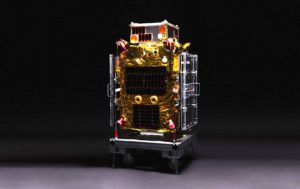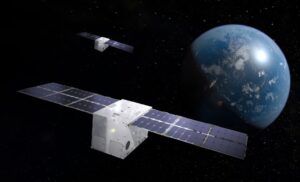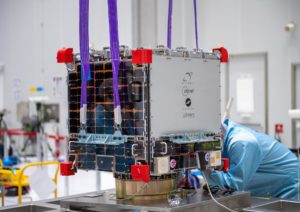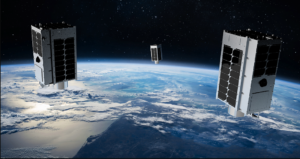There are 27,000 pieces of orbital debris travelling through space at speeds up to 17,500 mph being tracked by the Department of Defense’s global surveillance network, and there are hundreds of millions more that are too small to be tracked, according to a report by NASA.
Debris of any size traveling at high velocities is dangerous, but millimeter-sized particles pose the greatest risk of ending missions for satellites in low Earth orbit (LEO), according to the report.

As the number of satellite launches grows, solutions that can track and remove even the smallest orbital debris and prevent collisions in space could soon be in high demand.
The global orbital debris removal market is growing, projected to reach $1.5 billion by 2029, a 76.3% increase from just $866.4 million in 2021, according to market research firm Fortune Business Insights.
However, the orbital debris removal market must keep up with the surging global satcom market, which is projected to reach $56.7 billion in the next six years, a 106% leap from $27.6 billion just two years ago, according to Fortune.
An estimated 2,500 satellites are expected to be launched each year between 2022 and 2031 due to the increase in commercial constellations, according to a report by research firm Euroconsult.
U.S. government customers, such as the Space Development Agency (SDA) are driving 72% of the demand for these satellite launches.
LEO satellites make up most of these launches, with SpaceX’s Starlink comprising more than 3,500 satellites, and contemporaries such as OneWeb hosting over 500.
LEO Satellites have a shorter lifespan than satellites in geostationary orbit, lasting an average of five years, but were being kept in space for as many as 25 years until a September 2022 FCC ruling, stating that all LEO satellites must be de-orbited within five years.
The ruling does not apply to satellites operated by the SDA, which is planning a constellation of 300 to 500 LEO satellites for its transport later, according to the agency’s website.
Lack of government focus, accountability

The space sustainability market has received more attention as of late, but more must be done to prepare for the future, Brian Weeden, director of program planning, Secure World Foundation, a private organization dedicated to space sustainability, told Connectivity Business News.
“As an issue, space sustainability is definitely getting more important,” Weeden said. Space sustainability issues include congestion, radio frequency interference, light pollution and even weather, Weeden said.
“As far as the space sustainability market goes, it’s still pretty new,” he said. “There’s been a lot of discussion and a lot of research on those problems, but there isn’t really a global market for them.”
While the U.S. government has played a noteworthy role in the number of constellations, it has been slow to take a leadership role in addressing space sustainability, Weeden told CBN.
“Taking these concepts and turning them into actual capabilities” is another challenge yet to be overcome on a large scale, Weedon said.
The other question is who’s accountable for cleaning up orbital debris, Weedon said.
“Governments are really the biggest users of low Earth orbit and removing [orbital debris] costs a lot of money. Governments have been unwilling to spend that money even though, historically, governments are the ones that put all that debris up there.”
Brian Weeden, director of program planning, Secure World Foundation
Collisions ahead?
A foundational study on orbital debris conducted by NASA in 2008 concluded that stabilizing the growth of debris necessitates removing five to 10 large objects annually by 2021, Weeden said, but that undertaking never occurred.
There has been just one collision of debris involving active satellites, according to Weeden: The Iridium-Cosmos collision in 2009, in which an active commercial communications satellite, Iridium-33 collided with Cosmos 2251, an inactive Russian communications satellite.
The collision produced nearly 2,000 pieces of debris, Weedon said in a 2009 report after the incident, which is expected to remain on orbit for decades.
Video: Ansys Government Initiative, YouTube
The exact cost of Iridum-33 is not known to the public. This is due to the initial costs of the company’s original constellation being covered by telecommunications equipment company Motorola (NYSE: MSI) prior to Iridium filing for bankruptcy in 2000, after which the Iridium known today arose, a spokesperson for McLean, Va.-based Iridium Communications (NASDAQ: IRDM) told CBN.
“That said, technically the collision cost us nothing,” the spokesperson said. “We were replacing all our satellites [completed in 2019] and had a spare in orbit to immediately replace [Iridium-33].”
The spokesperson added that today, the cost of keeping its satellites from colliding into others is “negligible” due to the procedure of maneuvering satellites becoming more commonplace.
“It has just become a part of doing business,” the spokesperson said.
An isolated event, especially one without high costs to the operators, may not justify a proactive approach, so the government’s lack of initiative could be in part due to this infrequency.
“It’s really when we’re kind of hitting that tipping point when we’re going to see these really bad effects,” he said.
‘Significant deterioration of investor sentiment’
The space sustainability industry is led by key players, including:
- Japan-based orbital debris removal startup Astroscale;
- Milan-based “satellite taxi” manufacturer D-Orbit;
- Switzerland-based orbital debris remover ClearSpace;
- Lafayette, Colo.-based satellite refueling startup Orbit Fab; and
- Large public companies, such as defense contractor Lockheed Martin (NYSE: LMT), which use their own capital for sustainability initiatives.
In May 2016, London-based Seraphim Capital announced plans to launch the first venture capital fund dedicated solely to space.
Seraphim initially invested heavily in large constellations of satellites before expanding its portfolio to include companies focused on space sustainability efforts.
“We realized from the outset that we were part of the problem, because the companies that we were investing into were creating the large constellations and ultimately adding to the debris.”
Mark Boggett, chief executive, Seraphim Capital
The space tech firm has also invested in D-Orbit and Orbit Fab, Boggett told CBN.
Astroscale is one of several space sustainability companies that Seraphim Capital has invested in, Boggett said. The firm has also invested in D-Orbit and Orbit Fab, he said.
Boggett pointed to D-Orbit’s “space taxi” during last month’s 2023 Space Symposium in Colorado Springs, Colo. The taxi carries and places satellites in precise locations on orbit and can be used for deorbiting missions.
Astroscale has been fortunate to receive consistent support from investors, Chief Financial Officer Nobuhiro Matsuyama told Connectivity Business News. The company has raised $389.2 million, including a series G round of $76 million in February, according to Crunchbase.
“The biggest challenge has been a significant deterioration of investor sentiment, resulting in pullback from pre-profit deep-tech companies in general.”
Nobuhiro Matsuyama, chief financial officer, Astroscale
“Investors have been very selective in their investment approach, leading to a smaller number of companies being able to raise capital,” Matsuyama said.
Even with the $76 million already raised this year, Matsuyama told CBN he doesn’t see 2023 as a big year for fundraising.
“While sentiment seems slightly positive compared to 2022, there is still a significant drop in overall investor demand compared to a few years ago,” he said, attributing the decline to factors such as inflation, rising interest rates and “recent turmoil in equity markets.”
Matsuyama echoed a March statement from Matt O’Connell, operating partner at space investment firm Data Collective Venture Capital, during a panel at the Satellite 2023 conference in Washington, D.C.
Space investment received $2.2 billion in Q1 2022, according to venture capital firm Space Capital, down 53% quarter-on-quarter, and representing the lowest quarter for space investment since 2015.
Still room for startups

Not all startups will make it in the current economic environment, but there is interest from investors in space sustainability solutions, Boggett said.
Other companies developing space sustainability solutions include:
- Menlo Park, Calif.-based in-orbit services provider LeoLabs;
- El Segundo, Calif.-based space software company Slingshot Aerospace;
- Finnish satellite de-orbiting technology developer Aurora Propulsion; and
- Marquette, Mich.-based orbital debris mitigation startup Kall Morris.
“I believe space sustainability is a multibillion-dollar market,” Boggett said. “Looking at it from a business perspective, this is a giant opportunity that is just opening up.”
Companies with proven solutions that they patent early on are going to be able to raise money even in a selective investor market, Boggett said.
“There’s always a sort of flight to quality,” he added. In this kind of environment, “the strong tend to get stronger.”
While established players like Astroscale will be leading the way for a while, there are still opportunities for new startups that can provide technologically proven and affordable solutions, Boggett said.
Kall Morris, founded in 2019 during the pandemic by three Northern Michigan University alumni, already has three contracts totaling $750,000 from the U.S. Space Force for debris cleanup technologies.
The Marquette, Mich.-based company began developing its object-retrieving spacecraft, Laelaps, in 2020, co-founder and Director of Operations Troy Morris told CBN. The company is preparing for an International Space Station demonstration mission next year.
Kall Morris also plans to launch its first debris-cleaning satellite in 2025, Morris said.
‘Communitywide imperative’

Some large companies with money to spare, such as Lockheed Martin, are investing in space sustainability endeavors.
The defense contractor has invested in multiple next-generation platform demonstrations, a spokesperson told CBN, adding that LINUSS, its in-space upgrade satellite system comprised of two CubeSats, was the first.
Other platforms include its Augmentation System Port Interface, a docking prot designed to allow satellites operators to add updates to their satellites after launch, including additional storage and upgraded sensors, according to a company statement.
Lockheed declined to disclose the specific amount of investment, but the spokesperson told CBN it’s “in the millions.”
Lockheed in April announced that LINUSS had successfully showcased in orbit how small satellites can be used to upgrade constellations or provide refueling for other satellites.
“LINUSS also represents the intersection of multiple paths of investment, including research and development and direct investment in industry partners such as Terran Orbital (NYSE: LLAP) and OrbitFab,” the spokesperson said.
In April 2022, Lockheed released the technical design specifications for its Mission Augmentation Port, a docking adapter other that other satellite manufacturers can replicate and use to easily upgrade their own satellites on orbit, according to the spokesperson.
Long-term commercial payoff

Space sustainability isn’t only a safety and environmental issue; it also has both short-term and long-term financial impacts for operators, Seraphim’s Boggett said.
While investment in space sustainability companies may seem risky considering a lack of urgency, investing now may save money in the long run, especially for the U.S. government, which relies on satellites for intelligence and military operations Weeden said.
“Traffic is going to raise the cost of operating in space,” Weeden said. “That leads to a loss of capabilities and a loss of investment, stunting the economic growth in space.”
Satellite operators will also benefit in the short term from sustainability efforts, Boggett said.
“Satellites nowadays have an economic life of three to five years,” Boggett said. Satellites launched via rideshare, such as with a SpaceX Falcon 9 rocket, for example, are not guaranteed to end up at the precise desired location, and it can take up to six months to move the satellite into the correct position, he said.
“If it takes six months to move into position, you’ve lost a significant proportion of the time that you can make that satellite profitable,” Boggett explained.
Companies like Orbit Fab that offer in-orbit satellite refueling services also help save operators’ costs by extending use per payload, Boggett said.
D-Orbit’s satellite taxis can also use in-space refueling stations, enabling them to embark on multiple deorbiting missions, he said.
‘A force for good’

While there are potential consequences to thousands of satellites orbiting the Earth, it’s important to view satellite launches positively, Boggett said.
“A lot of people really don’t understand how space is a force for good,” he said.
Satellites have numerous uses beyond communications, particularly in the areas of climate and environmental monitoring, Boggett added.
Satellite operators that practice sustainability can present additional appeal to investors, he said.
Canadian-based GHGSat, for one, is launching its first commercial carbon dioxide-monitoring satellite later this year, Stephane Germain, the company’s founder and president, recently told CBN.
GHGSat, according to Crunchbase, has raised more than $100 million since its 2011 founding and is not only using satellites to promote environmental sustainability on Earth but participating in initiatives to monitor the space environment and mitigate orbital debris, Germain said.
“Satellites can enable us to catch bad actors who are chopping down rainforests or dumping effluent into the seas,” Boggett told CBN, highlighting that Earth sustainability is an immediate concern.
While Seraphim has not invested in GHGSat, Boggett said, the firm has provided venture capital funds to several of its contemporaries, including:
- Espoo, Finland-based Earth imaging company Iceye;
- London-based climate monitoring satellite operator Satellite Vu;
- Vienna, Va.-based data analytics company Spire Global (NYSE: SPIR);
- Westfield, Ind.-based agricultural technology company Taranis; and
- Boston-based weather technology company Tomorrow.io.
It’s important for people to understand the breadth of what satellites do and the role investors can play in supporting these efforts while also helping to maintain a safe and prosperous space environment, Boggett said.









